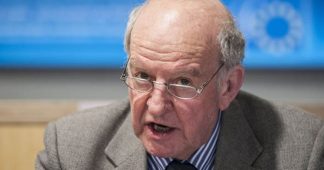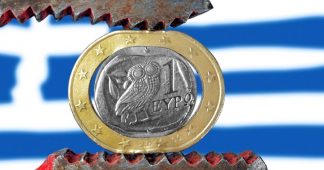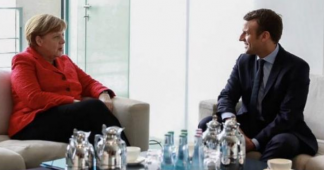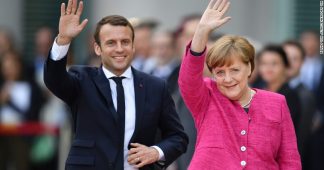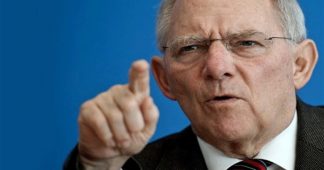The outcome of the negotiations for a Grand Coalition in Germany has been remarkable. For the SPD to get foreign affairs and labour is not surprising, but to gain the finance ministry is more than many could have hoped. The appointment of Olaf Scholz, Mayor of Hamburg, also might mean a new direction for Germany in Europe. He has spoken in favour of a balanced budget and sound finances but told Der Spiegel: “We don’t want to dictate to other European countries how they should develop” and that “Mistakes were surely made in the past”. He also has told Die Welt that Germany urgently needs to respond to proposals for reshaping Europe by French President Emmanuel Macron.
One of the under-reported proposals by Macron is for the EU bonds first put forward in 1993 by Jacques Delors that since then have become known as Eurobonds. The prospect of their adoption may seem scant granted that Angela Merkel pronounced in 2012 that these would only be issued “over her dead body”. But a key question is whether Merkel understands the nature of bonds any more than did Helmut Kohl who, in 1996, was opposed to the European Investment Bank extending its bond issues to finance investment in the cohesion and convergence areas of health, education, urban renewal, environmental protection and venture capital finance for SMEs. When this was proposed by then Portuguese prime minister Antonio Guterres, Kohl stated that he was opposed since “the German taxpayer has paid enough”. Yet when he then was briefed that EIB bonds are not financed from taxation any more than those of the German Reconstruction Credit Institution the KfW, he changed his mind and, at the next European Council meeting in Amsterdam in the spring of 1997, supported their extension.
There also was something in the same briefing to Kohl of which he had been unaware and that Merkel may not yet appreciate: EIB bonds do not count on the debt of Germany or any other major member state of the Union, nor need count on the debt of others. In this regard, they parallel US Treasury bonds which do not count on the debt of California or Delaware. What’s more, the servicing of EIB bonds is by the member states which gain from the investments that they fund, not by fiscal transfers from others, or from the Commission’s tax funded Own Resources. Further, aided by the Amsterdam criteria for social and environmental investments, the EIB quadrupled its investment finance in the decade from 1997 until the financial crisis to four fifths of Own Resources.
Is there a caveat? Yes. By convention (rather than a Treaty commitment) the EIB only finances half of any investment project. Member states mainly make up the rest on which, even before the 2007-08 financial crisis, they were constrained by the 1992 Maastricht debt and deficit conditions. This is why in 1993 I suggested the European Investment Fund – EIF – to Delors to match EIB funding by complementary bonds. With also the macroeconomic aim of recycling global surpluses in pension funds and sovereign wealth funds which, thereafter, flooded into US Treasuries for lack of alternative outlets – without the eco-social investments from joint EIB-EIF bond funding rather than fostering speculation in subprime and other toxic financial derivatives.
SPD – and Macron – on board
If Scholz were to support the case for joint EIB-EIF bond funding of investments he would not be alone in the SPD. Key figures already briefed on it include Peer Steinbrück, Frank-Walter Steinmeier and Sigmar Gabriel who in April 2012 made a joint statement on Why We Need a Social Market, in which they said that more national debt and credits were the ‘wrong road’ but that an investment-led recovery could be achieved through the EIB and by better use of the Commission’s Structural Funds. The same goes for Martin Schulz who, in a meeting with myself and the MEPs Elena Ferreira and Jacek Saryusz-Wolski in 2013, declared: “Go with this and make sure you do so in my name”, prompting Spiegel thereafter to deem him “a committed Eurobonder”.
Moreover, the joint EIB-EIF case has been fully grasped by Emmanuel Macron. When minister of economy and industry in the second Valls government he argued in September 2014 that to offset the low subscribed capital of the EIF the EU should access unused resources from the European Stability Mechanism. As an adviser put it : “If we could mobilise €20 to €40 billion from the ESM, for example to recapitalise the EIF, you then have a multiplier effect on the EIB that can reach almost €200 billion of public money”.
Wolfgang Schäuble opposed Macron, claiming that this was not within the ESM’s remit. But legal advice to the European Parliament declared that it was not excluded that the ESM should ‘fulfil other tasks’ to assure the stability of the euro for which a sustained recovery of the European economy is vital. Besides which the private sector multipliers from EIB investments range up to three, which could mean that the total public and private investment generated could reach some €600 billion, with further employment and income multipliers. And, because the Roosevelt New Deal was bond financed, it managed to reduce unemployment from 22% to 8% in the seven years from 1933 to 1940 with an average annual federal deficit of only 3%, i.e. the Maastricht limit.
Schäuble is no longer German finance minister whereas Macron is President of France. And, If Macron chose to restate the integration case within the ever-valid France-German axis that propelled the initiative for a European Community in the 1950s, this could retrieve the European Germany to which Adenauer, Brandt, Schmidt and Kohl aspired rather than the German Europe which emerged with the austerity demands of Schäuble and Merkel after the financial crisis of 2007-08.
* Stuart Holland was Labour MP in London Vauxhall and then adviser to Jacques Delors. He is a visiting Professor at the Faculty of Economics of the University of Coimbra and a Senior Scholar of the Institute of Social and European Studies, Köszeg, Hungary. He is author of Beyond Austerity: Democratic Alternatives for Europe (www.spokesmanbooks.com)
